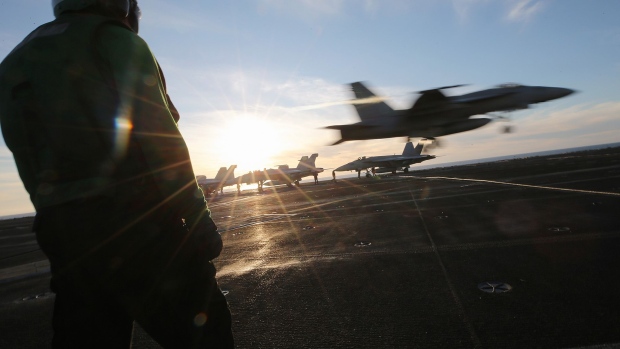Jun 16, 2021
U.S. Needs ‘Combat-Credible’ Forces to Deter China, Nominee Says
, Bloomberg News

(Bloomberg) -- The U.S. military should maintain a “combat-credible” posture in the Indo-Pacific to help deter potential Chinese aggression, President Joe Biden’s nominee to be assistant secretary of defense for the region told senators.
Such an approach would include the “forward” positioning of U.S. forces in order to “deter, and, if necessary, deny a fait accompli scenario” where China tries to quickly overwhelm Taiwan, Ely Ratner told the Senate Armed Services Committee in written answers to questions for his confirmation hearing Wednesday.
The strategy would also include “new operational concepts, modernized and high-end ready forces, and capable allies and partners proficient in their warfighting roles,” he said.
Ratner’s testimony comes as the U.S. and China are clashing over everything from technology to China’s militarization of the disputed South China Sea. On June 15, China’s air force sent 28 aircraft close to Taiwan -- the largest sortie this year -- further ratcheting up military pressure on the government in Taipei as it seeks to strengthen ties with the U.S.
Why Taiwan Is the Biggest Risk for a U.S.-China Clash: QuickTake
Ratner described China’s People’s Liberation Army in written comments as “mission focused.”
It’s “well-resourced, and rapidly developing both in terms of direct military pressure on Taiwan and through other PLA capabilities aimed at deterring, delaying or denying third-party intervention in a crisis,” he said. If confirmed, Ratner said, he will “carefully review the current military balance across the Taiwan Strait to ensure that our defense cooperation with Taiwan is commensurate with the threat posed” by China.
Washington and Beijing have been issuing warnings to each other regarding Taiwan since Biden took office in January, adding to tensions that increased steadily during the Trump administration. The most recent exchange emerged from the Group of Seven summit in the U.K. over the weekend as leaders, at Biden’s behest, expressed concerns over Taiwan as well as Xinjiang and Hong Kong. China responded by calling the U.S. “very ill.”
Read More: China Sends 28 Planes Near Taiwan in Year’s Largest Exercise
Until last week, Ratner led a China task force at the Pentagon aimed at reorienting America’s military to better compete with Beijing. Based on the task force’s recommendations, Defense Secretary Lloyd Austin issued a directive “designed to focus departmental processes and procedures and better help department leaders contribute to whole-of-government efforts to address the challenge from China.”
Ratner served as deputy national security advisor to then-Vice President Biden from 2015 to 2017. He also held positions at the State Department, the Senate and the Center for a New American Security.
The Senate Armed Services Committee also heard testimony from Caroline Krass, Biden’s nominee to be general counsel of the Defense Department; Gina Ortiz Jones, nominee for under secretary of the Air Force; Shawn Skelly, nominee to be assistant secretary of defense for readiness; and Meredith Berger, nominee to be assistant secretary of the Navy for energy, installations and environment.
©2021 Bloomberg L.P.